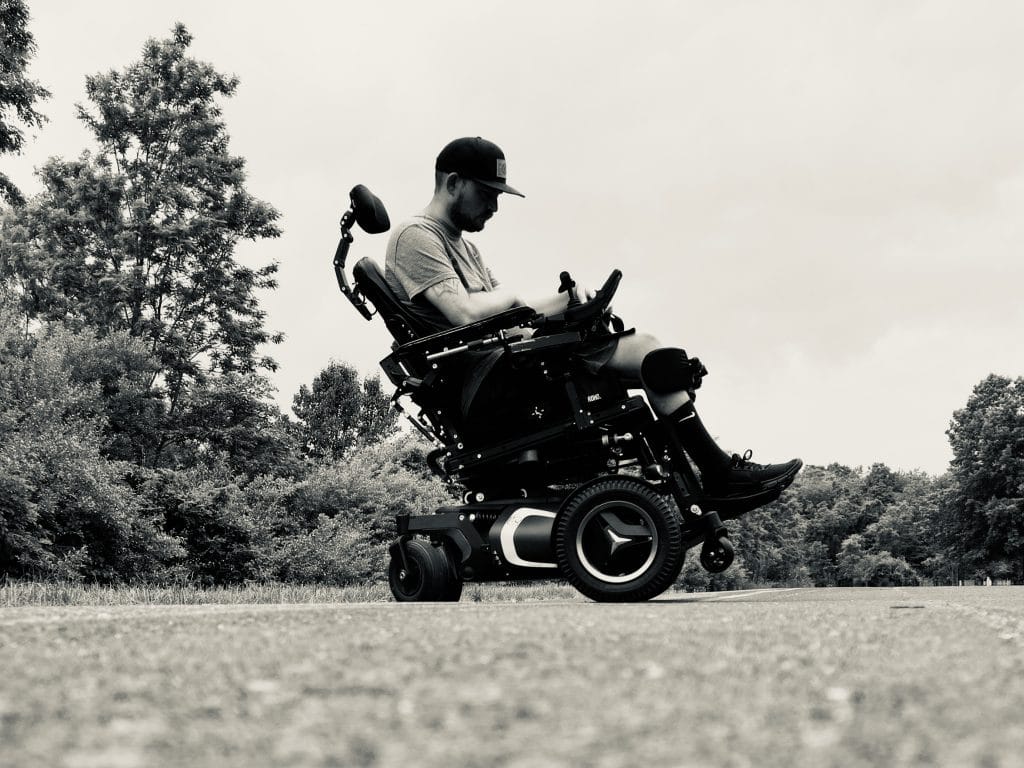Tell us about yourself and your background
I am an Inclusive Flight Advocate and USAF veteran from Waynesboro, Virginia. After suffering a catastrophic spinal cord injury in 2016, I have devoted my time in educating and training individuals of all “Abilities” in assistive technology, vocational skills, and adapted sUAS operations. I am paralyzed from the chest down and have no finger function in my hands. Through many hours of research and development I have found many solutions in adapting sUAS controllers and systems. I have developed a fully inclusive drone training program based around the Skydio 2 platform and have conducted training with people from various backgrounds and walks of life. I’m currently working on ways to expand this inclusive sUAS training in hopes to provide a means of flight for people who otherwise would be grounded.
How did you get started in the industry you are in? What interested you most about it?
I have always had an interest in all things aviation. While in the Air Force, my exposure to early iterations of sUAS and RPA technologies led me to recreational flying and building personal aircraft for fun. After my injury in 2016, I began teaching a vocational training course built around robotics and STEM education. I began exploring possibilities of sUAS operations post injury and once I realized that with slight modifications flight was possible again, I began working with others who have various physical and cognitive disabilities training them to fly sUAS. I love the freedom and joy flying sUAS brings to so many people and the possibilities of opportunity it brings them.
Tell us about your organization and your role
In effort to advocate for inclusive sUAS operations, Rob has joined forces with two nonprofit organizations. He is the active Career Programs and Business Development Director, of Drone Forward Inc (DFI). A nonprofit organization dedicated to providing STEAM based education that will engage and empower youth to pursue fulfilling career paths in technology, robotics, and UAV industries. In a very short time DFI has lobbied and successfully developed plans with the FAA to ensure test materials and facilities offer reasonable testing accommodations to people with disabilities taking their Part 107 exam. In addition Rob serves as the Adaptive sUAS Advisor, for Wounded Eagle UAS, a nonprofit that assists in training veterans in sUAS operations for vocational purposes.
What do you enjoy must about working in the industry you are in?
Helping others and meeting so many forward thinking minds. Since I began adapting and promoting inclusive drone operations, the community has been so accepting of my ideas and mission.
Share a success story
Developing ways to make sUAS more inclusive and diverse is a success story everyday. I have assisted in training seven individuals with various disabilities obtain their Part 107. I help fellow veterans fly for vocational and therapy to gain employment or combat conditions such as PTSD. Helping others get over hurdles will always be how I measure success.
Share a failure and what you learned from it
My biggest learning point came from the first adaptive sUAS program I developed. The program was solid and scalable. A lot of hours of research went into the program and I felt it was going to revolutionize adaptive sUAS. Unfortunately, the state entity I created the program for had a hard time justifying the program as a value added training, due to job data not reflecting the need. In hindsight, I should have fought harder to explain the technology to stakeholders better and show the vast possibilities of sUAS operations.
What excites you most about the future of autonomous technologies?
Advancement in autonomy is extremely exciting for me as a parson who lives with a significant physical disability. The day I can independently roll out to my vehicle and it takes me wherever I need to go is a wonderful day. Autonomy has already done so much for my ability to safety fly sUAS. So for myself, I think autonomy equals inclusion for so many people.
What would you say to people who are skeptical about autonomous technology?
Growing pains emerge when introducing new things no matter what the realm. Change can be difficult, but give the good change a chance before you focus on the negative. This technology will positively impact so many lives.

Rob Corbett’s Story
November 12, 2021
